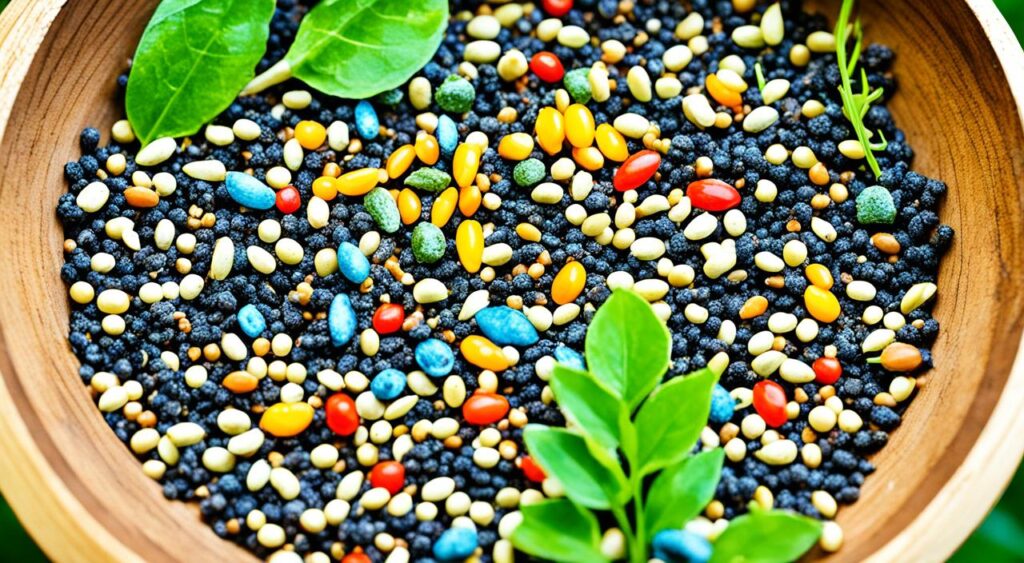Have you ever thought if your parakeet is really getting the best from their food? Keeping your pet bird healthy and happy means giving them a diet full of nutrients. But with so many choices, picking the right one can be tough.
This guide will dive into parakeet nutrition and show you the best foods out there. You’ll see how to mix high-quality seed mixes, pellets, fruits, and veggies for the best diet. This will help your parakeet stay healthy and happy.
Key Takeaways
- Discover the best parakeet food options for a balanced and nutritious diet
- Understand the importance of a nutrient-rich diet for your parakeet’s health
- Learn about the benefits of parakeet pellets, seed mixes, and fresh produce
- Explore vitamin and mineral supplements to enhance your parakeet’s nutrition
- Discover healthy treats and foraging toys to encourage natural behaviors
Introduction to Parakeet Nutrition
Feeding your parakeet a balanced diet is key to their health and happiness. Parakeets, or budgies, need certain foods to stay healthy. We’ll talk about why a balanced diet is important and what nutrients your parakeet needs.
The Importance of a Balanced Diet
A balanced diet is vital for parakeets. It helps them grow, keeps their immune system strong, and keeps their feathers healthy. They need proteins, carbs, fats, vitamins, and minerals to be healthy. Without these, they could get sick, gain too much weight, or even have organ problems.
Understanding Your Parakeet’s Dietary Needs
Parakeets have special dietary needs to stay healthy and happy. Their diet should have parakeet nutrition, including balanced diet and fresh fruits and veggies. Knowing what nutrients they need helps you give them a diet that keeps them well.
For the best nutrition, know the important parts of their diet. These include:
- Proteins: Needed for growth, fixing tissues, and building muscles
- Carbohydrates: Give energy and help overall health
- Fats: Keep feathers healthy, insulate them, and give energy
- Vitamins and Minerals: Important for fighting off sickness, keeping bones strong, and other body functions
Adding these nutrients to your parakeet’s food helps them stay healthy and full of life.
“A balanced diet is the foundation of a healthy parakeet. By understanding their unique nutritional needs, you can provide the best care for your feathered friend.”
Choosing the Right Parakeet Food
Choosing the best food for your parakeet is important. You have many options to pick from. Each type of food has its own benefits and things to think about. We’ll help you pick the right parakeet food for your bird’s needs and likes.
High-quality parakeet diet options like Lafeber Premium Daily Diet Parakeet Food are a great choice. This food is full of antioxidants, minerals, and omega fatty acids. It gives your parakeet the right mix of protein, minerals, and fats for good health. Lafeber has been making top-notch bird food since the 1970s, using only domestic grains and no artificial stuff.
Another good option is selecting parakeet food like ZuPreem FruitBlend Flavor Pellets. These are lower in fat, which is good for your parakeet’s heart. Or, you could go with Wild Harvest Daily Blend Nutrition Diet Parakeet Food. It has extra vitamins and minerals like A, D3, and B12 for extra nutrition.
“Avian veterinarians estimate that poor nourishment is the underlying cause of about 75 to 80 percent of the medical problems they see in pet birds.” – Bird Talk April 2010
For a natural choice, try Dr. Harvey’s Our Best Parakeet Food. It has seeds, grains, fruits, veggies, and nuts in a big 4-pound bag. It’s fresh and doesn’t have any preservatives, dyes, or extra vitamins. Living World’s Premium Mix is similar, with seeds, grains, fruits, veggies, and nuts made just for parakeets and other birds.
No matter what parakeet food you pick, make sure it’s varied and balanced. This way, your parakeet gets all the nutrients it needs. Think about the food’s ingredients, quality, and what your parakeet likes. This helps you choose parakeet food that keeps your bird healthy and happy.
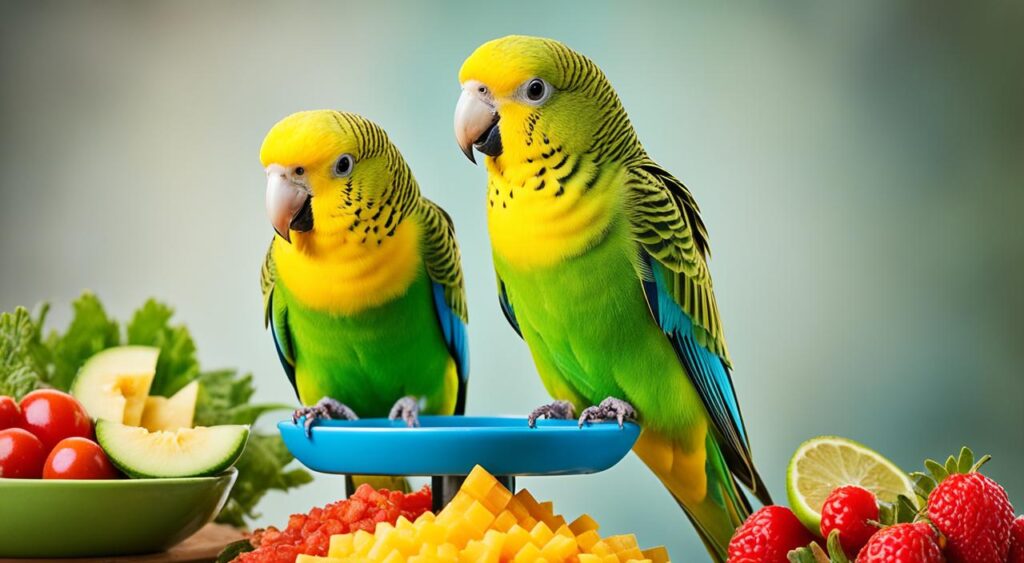
Best Parakeet Food Pellets
High-quality pellets are a great choice for your parakeet’s diet. They are made to meet the special needs of these colorful birds. These pellets are packed with nutrients and easy to feed.
Nutrient-Rich Pellet Options
Here are some top-rated pellets for parakeets:
- Roudybush has been around since 1975, showing over 45 years of experience in making top bird food pellets.
- Lafebers has been making great bird food pellets for over 35 years, proving its quality and reliability.
- Higgins Premium Pet Foods has been a leader in quality bird food pellets since 1972, with nearly 50 years of expertise.
- Zupreem is a well-known brand that focuses on a balanced diet full of antioxidants, vitamins, and minerals.
- Pretty Bird offers a wide range of pellets for different bird types, like Lory, African Grey, and Parakeet, giving bird owners many choices.
Benefits of Pellets over Seeds
Pellets have many benefits over seed diets. They are higher in protein and have a better balance of nutrients, which lowers the risk of health problems. Pellets also have less fat than seed mixes, which is good for parakeets’ hearts. Brands like ZuPreem FruitBlend Flavor Pellets and Wild Harvest Daily Blend Nutrition Diet Parakeet Food are made just for parakeets.
“Switching to a high-quality pellet-based diet can significantly improve the overall health and well-being of your parakeet.”
Using parakeet food pellets as the main part of your bird’s diet ensures they get a balanced and nutritious meal. This supports their growth, energy, and long life.
Best Seed Mixes for Parakeets
Pellets are the top choice for parakeet nutrition, but seed mixes also have a role in a balanced diet. We’ll look at some top parakeet seed mixes. These mixes are full of vitamins, minerals, and other key nutrients.
Parakeets love to forage and explore different foods. Adding seed options to their diet helps them act naturally and enjoy their meals. Let’s see why these seed mixes are good for parakeets.
Fortified Seed Blends
Fortified seed blends give parakeets a wider range of nutrients than regular mixes. They have extra vitamins, minerals, and nutrients that boost health and well-being.
- Kaytee Egg-Cite! Forti-Diet Parakeet Bird Food: This blend has 14% protein, 4.5% fat, and 12% moisture. Feed 1–3 tablespoons a day.
- Kaytee Supreme Parakeet Bird Food: It offers 12% protein, 3.5% fat, and 12% moisture. Lasts up to 45 days if stored right.
- ZuPreem Natural Medium Bird Food: This mix has 2.5 pounds of high-protein pellets, made in the USA.
- Lafeber Classic Avi-Cakes Small Bird Food: With 12.5% protein and 15% moisture, it comes in an 8-ounce bag.
- Roudybush Daily Maintenance Mini Bird Food: This 2.75-pound pellet mix includes apple flavor, quality nutrition, and oil for healthy feathers.
These fortified seed blends offer a nutritious meal and encourage natural foraging. They let your parakeet explore and enjoy a varied diet.
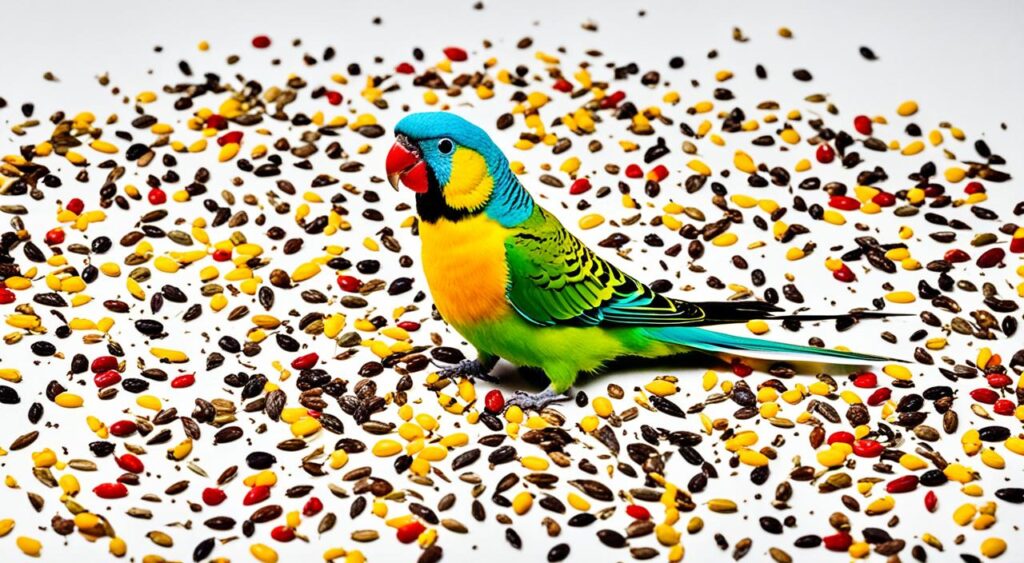
“A balanced and nutrient-rich diet is key for parakeets’ health. Fortified seed blends are a great addition to their diet.”
While seed mixes are tasty and fun for parakeets, they should be given in moderation. They should be part of a diet that includes pellets, fruits, vegetables, and supplements. Choosing the best parakeet seed mixes and adding them to your bird’s diet ensures they get the nutrients they need to be healthy.
Incorporating Fresh Fruits and Vegetables
Adding fresh fruits and vegetables to your parakeet’s diet is great. It makes their meals varied and nutritious. These foods are full of vitamins, minerals, and fiber. They help keep your parakeet healthy and happy.
Nutritious Options for Your Parakeet
Parakeets can eat many fresh foods. Here are some top picks:
- Bright-colored vegetables like carrots, bell peppers, and sweet potatoes, which are rich in vitamin A.
- Dark, leafy greens such as spinach and kale, packed with vitamins and minerals.
- Juicy fruits like berries, melon, and mango, providing natural sweetness and hydration.
Start adding new foods slowly to avoid upsetting your parakeet’s stomach. Try to give them different fresh foods. They should make up about 20-25% of their diet.
“Fresh, crunchy vegetables and juicy fruits provide an excellent source of essential nutrients for parakeets, making them a vital component of a balanced and varied diet.”
Don’t give them avocado, onions, or garlic as they can be toxic. Always make sure they have clean, fresh water with their meals.
Adding a mix of fresh fruits and vegetables to your parakeet’s diet is good for them. It meets their natural eating habits and boosts their health. Try different foods to see what they like best!
Vitamin and Mineral Supplements
A balanced diet of parakeet food pellets, seeds, and fresh produce gives your parakeet most of the nutrients they need. Yet, sometimes, vitamin and mineral supplements are needed. These supplements ensure your parakeet gets all the vitamins and minerals for good health.
Parakeets often need extra calcium for strong bones and healthy feathers. It’s hard to get enough from food alone. Vitamin and mineral supplements for parakeets with calcium can help fill this gap.
- Vitamins A, D, and E are key for parakeets and might need supplementing if their diet lacks them.
- Minerals like iron, zinc, and iodine are also crucial and might need extra in some cases.
Choosing the right parakeet nutritional supplements is key. Pick high-quality, bird-safe formulas made for parakeets. Don’t use human supplements, as they can be harmful. Look for supplements without artificial additives and preservatives, and make sure they have the right balance of vitamins and minerals.
“Proper supplementation can help ensure your parakeet is getting all the essential nutrients they need to thrive.”
Start adding vitamin and mineral supplements slowly and with a vet’s advice. They can tell you the right amount and how often to give it, based on your bird’s diet and health.

With the right parakeet nutritional supplements, you can support your bird’s health and happiness. This ensures they have the energy and vitality to live their best life.
Healthy Treats and Foraging Toys
Offering your parakeet healthy treats and foraging toys is key to their well-being. These items are not just rewards. They also boost their natural behaviors, spark curiosity, and keep them active.
Encouraging Natural Behavior
Parakeets are smart and love to explore. Foraging toys for parakeets tap into this curiosity. They make your parakeet work for their food, just like in the wild.
Adding healthy parakeet treats is great too. They reward your bird and keep them busy. Use them during training or just for fun.
- Encourage natural foraging behaviors with puzzle feeders and complex toys
- Provide a selection of healthy parakeet treats as rewards and to supplement their diet
- Choose treats that are made with natural ingredients and offer nutritional value
“Incorporating foraging toys and healthy treats into your parakeet’s routine can significantly enhance their mental and physical well-being.”
By focusing on your parakeet’s natural behaviors, you make their life more interesting. This helps them stay healthy and happy.
Best Parakeet Food Brands
Choosing the right parakeet food can be tough with so many options. But, some brands stand out for their quality and care. They are trusted by pet owners and experts. We’ll look at top brands that focus on natural ingredients and meet parakeets’ nutritional needs.
Reputable and Trusted Brands
Lafeber is a top choice for parakeet food. They’ve been in the business for over 50 years. Their food is balanced and complete, with all the vitamins and minerals your parakeet needs.
Zupreem is another great option. They offer a variety of foods, including pellets, seeds, and dried fruits and veggies. They use natural ingredients and avoid artificial additives.
Kaytee and Roudybush are also trusted brands. They make high-quality foods that fit parakeets’ unique needs. These birds are smart and active, so they need the right food to stay healthy.
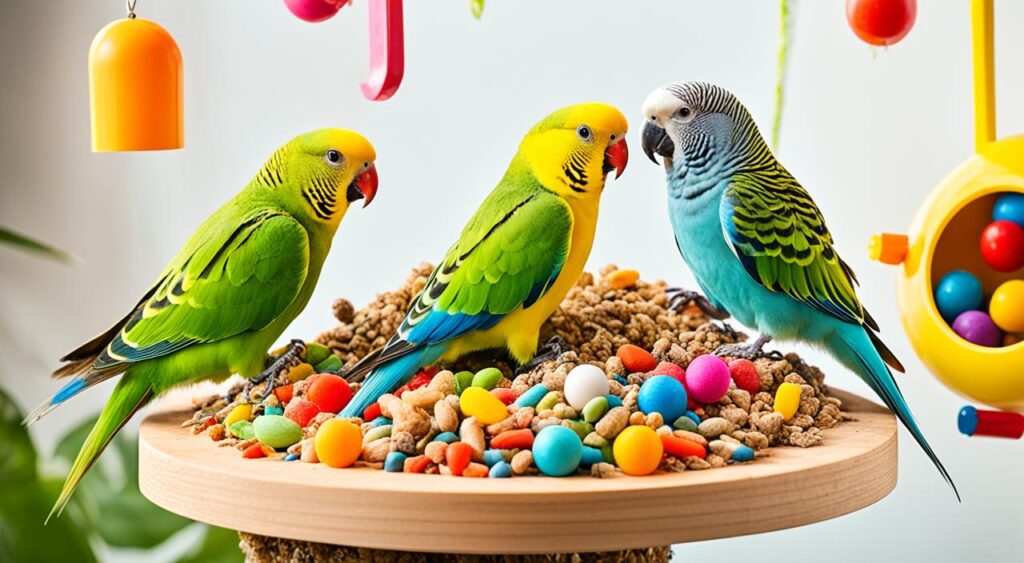
“Providing your parakeet with a balanced and nutritious diet is essential for their overall health and well-being. By choosing from the best parakeet food brands, you can ensure that your feathered friend is getting the nutrients they need to thrive.”
Transitioning to a New Diet
Changing your parakeet’s diet can be tricky, but it can go smoothly with the right steps. Whether you’re moving from seeds to pellets or adding fresh foods, do it slowly. This helps avoid tummy troubles and keeps your bird happy and healthy.
The transitioning parakeet to new diet should be slow. Begin by adding a little of the new food to their usual diet. Then, slowly increase the new food over a week or two. This lets their stomach get used to the new food safely.
Watch how your parakeet reacts to the new changing parakeet food. Look for changes in eating, droppings, and behavior. If they seem upset, like eating less or droppings are off, slow down the introducing new parakeet food process. Or, talk to your vet for advice.
- Start by mixing a small amount of the new food with your parakeet’s current diet.
- Gradually increase the ratio of new to old food over the course of a week or two.
- Monitor your parakeet’s response and be prepared to slow down the transition if necessary.
- Consult your veterinarian if you have any concerns or questions about the transitioning process.
By taking these steps, you can make the switch to a new diet easy and stress-free for your parakeet. This keeps them happy and healthy.
“Transitioning your parakeet’s diet requires patience and care, but the rewards of a healthier, happier bird make it well worth the effort.”
Best Parakeet Food for Breeding Birds
Parakeets that breed or raise young need special food for their energy and the growth of their babies. The best parakeet food for breeding should be balanced. It should meet the high nutritional needs of these birds.
For breeding parakeets, a diet rich in protein is crucial. Protein helps the chicks grow and keeps the parents healthy. High-quality pellet formulas made for breeding parakeets are great. They give a lot of protein and other important nutrients.
- Choose pellets with at least 16% protein to help with breeding and raising.
- Add calcium-rich foods like cuttlebone or eggshells for strong chick bones.
- Give fresh fruits and vegetables for extra vitamins, minerals, and fiber. This helps with digestion and health.
Along with pellets, a nutrient-dense seed mix is good for breeding parakeets. These seed mixes have important vitamins and minerals. They meet the birds’ high nutritional needs.
“Providing a balanced and nutritious diet is crucial for the success and well-being of breeding parakeets and their chicks.”
The main aim is to give breeding parakeets a varied, high-quality diet. This diet supports their special needs during this important time. By focusing on the nutritional needs of breeding parakeets, you help them and their babies thrive.
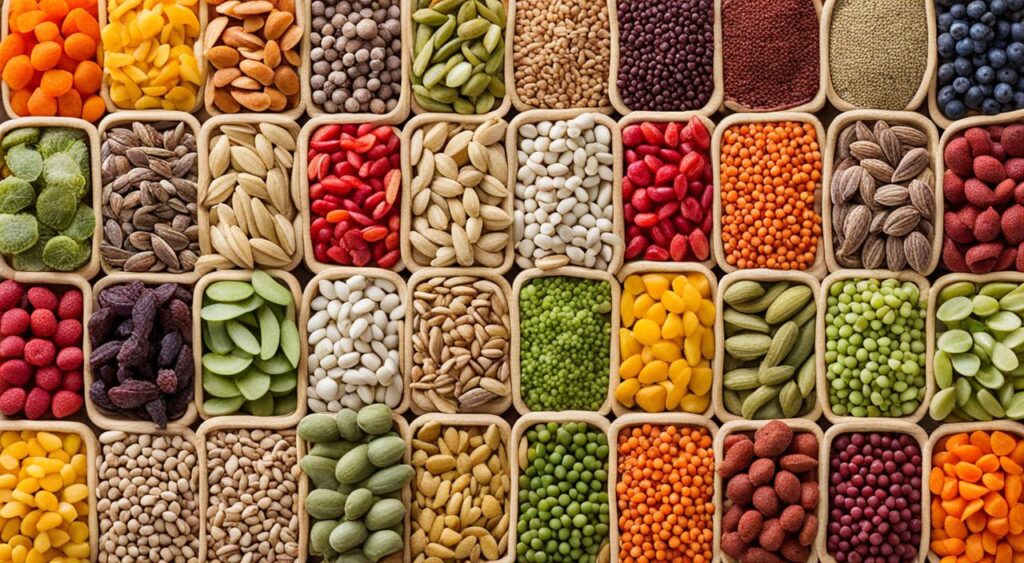
Organic and Non-GMO Options
Health-conscious pet owners are now looking for natural and less processed foods for their pets. This includes organic and non-GMO parakeet food. These foods are good for your bird’s health and can help them live longer.
Organic parakeet food doesn’t have synthetic pesticides, fertilizers, or other bad chemicals. It’s made with sustainable farming, giving your bird pure, natural nutrients. Organic parakeet food also doesn’t have GMOs, which are a worry for health and the environment.
Non-GMO parakeet food is similar, focusing on ingredients not changed by genetic engineering. So, it’s safe and doesn’t harm your parakeet’s health. Choosing organic and non-GMO foods means your bird gets a clean, honest diet instead of regular bird feed.
With organic and non-GMO parakeet food, your pet gets lots of vitamins, minerals, and antioxidants. This diet helps with feather health, energy, and a strong immune system. All these can make your parakeet happier and live longer.
“Providing your parakeet with the highest-quality, natural-based diet is one of the best ways to support their overall well-being and longevity.”
If you’re new to parakeet ownership or want to improve their diet, try organic and non-GMO parakeet food. It’s a great choice for your feathered friend.
Portion Control and Feeding Schedule
Keeping your parakeet healthy depends a lot on proper parakeet portion control and a steady feeding schedule. Feeding your bird too much can cause weight problems, while not enough can lead to nutritional issues. It’s important to find the right balance for your parakeet’s health.
The amount of food your parakeet needs changes based on their age, how active they are, and their health. Generally, give your parakeet just enough food for until the next meal. Don’t leave food out all the time, as it can lead to overeating.
- For adult parakeets, aim to feed them 1-2 tablespoons of high-quality pellets or seed mix per bird, twice a day.
- Supplement their diet with fresh fruits and vegetables, providing roughly a tablespoon’s worth per bird, per day.
- Introduce any new foods gradually, allowing your parakeet to adapt to the changes in their parakeet feeding schedule.
Having a regular feeding routine is key for your parakeet’s health. Try to feed your bird at the same time every day. This helps them develop a natural foraging pattern. It also makes sure they get the right amount of food and supports their natural behaviors.
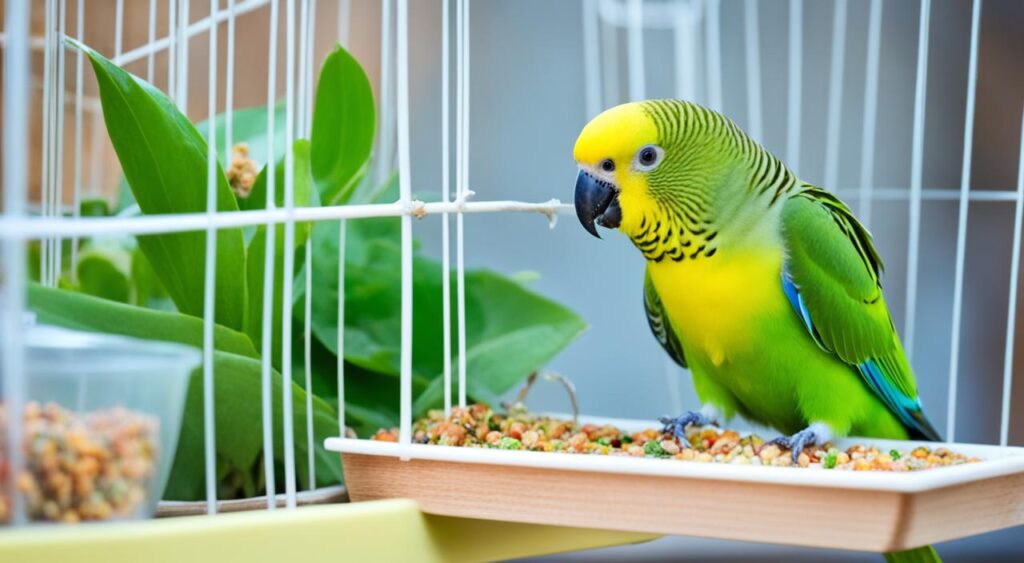
Every parakeet is different, so their dietary needs can vary. Watch your bird’s weight, energy, and overall look. Adjust their food amounts and schedule as needed. By finding the right balance, you can help your parakeet live a long, healthy, and happy life.
Signs of a Healthy Parakeet Diet
Feeding your parakeet the right foods is key to their health and happiness. Knowing the signs of a good diet helps you keep your bird in top shape. Let’s look at the main signs that show your parakeet is eating well.
A healthy parakeet looks good. They should have shiny, colorful feathers without any bare spots. Their eyes should be bright, and their beak and claws should be strong. They should also have a healthy weight, not too skinny or too fat.
How active your parakeet is also shows if they’re eating right. A well-fed parakeet loves to play and explore. They should climb, flap their wings, and interact with people or other birds. If they seem tired or don’t want to play, they might not be getting enough nutrients.
Watching what your parakeet poops out is also important. Healthy droppings are well-shaped, consistent, and don’t smell too bad. If their droppings change a lot, it could mean a diet problem.
By watching your parakeet’s looks, energy, and actions, you can make sure they’re eating right. This helps them stay healthy and happy for a long time.
“Maintaining a healthy parakeet diet is crucial for their longevity and happiness. Pay attention to the signs, and make adjustments to ensure your feathered friend thrives.”
Conclusion
In this guide, we’ve looked at what a healthy diet for your parakeet should include. We talked about the best foods like nutrient-rich pellets and seed mixes. We also covered the role of fresh fruits and veggies, along with vitamins and minerals.
Understanding what your parakeet needs to eat is crucial. Choosing the right foods and sticking to a regular feeding schedule is key. This ensures your bird stays healthy and happy.
Let’s summarize the main points about feeding your parakeet. These birds need a diet that’s full of nutrients to support their active life and health. Using high-quality pellets, seed mixes, and fresh produce is important.
Having a balanced diet is essential for your parakeet’s happiness and health. By using the advice in this guide, you can make sure your bird gets the best nutrition. This will help them live a long and healthy life.
FAQ
What are the essential elements of a healthy and balanced diet for parakeets?
A parakeet’s diet should include pellets, seed mixes, fresh fruits and veggies, and supplements. These foods provide the nutrients they need to stay healthy.
Why is a balanced diet important for parakeets?
A balanced diet helps parakeets grow strong, keeps their immune system healthy, and supports their feathers. They need specific foods to stay well.
What factors should I consider when choosing the best parakeet food?
Look at the food’s nutrient mix, quality of ingredients, and your parakeet’s taste preferences. This ensures they get a varied and balanced diet.
What are the benefits of parakeet food pellets?
Pellets offer a complete and balanced diet. They have more protein, better nutrients, and reduce the risk of nutritional problems compared to seeds.
How can seed mixes contribute to a parakeet’s diet?
Seed mixes can be enriched with vitamins and minerals. They are important for a balanced diet, along with pellets and fresh foods.
What fresh fruits and vegetables are safe and nutritious for parakeets?
Parakeets can eat many fresh fruits and veggies. These foods are safe and help meet their nutritional needs.
When and why might parakeet vitamin and mineral supplements be necessary?
Supplements are needed if their diet lacks certain vitamins or minerals. They ensure parakeets get all the nutrients they need to be healthy.
How can healthy treats and foraging toys contribute to a parakeet’s well-being?
Healthy treats and toys encourage natural behaviors. They make parakeets curious, active, and happy.
What are some of the best parakeet food brands to consider?
Top brands use natural ingredients and create diets that parakeets need. They focus on quality and nutrition.
How do I successfully transition my parakeet to a new diet?
Mix the new and old foods slowly and watch how your parakeet reacts. This helps them adjust without stress.
What are the unique nutritional requirements for breeding parakeets?
Breeding parakeets need more nutrients for their energy and baby birds. Their diet must be rich in certain nutrients and minerals.
What are the benefits of choosing organic and non-GMO parakeet food options?
Organic and non-GMO foods offer a natural diet. They can make your parakeet healthier and live longer.
How much food should I feed my parakeet, and how often should I feed them?
Feed your parakeet the right amount and at the same time every day. This keeps them healthy and prevents weight problems.
What are the signs of a healthy parakeet diet?
A healthy diet shows in their looks, energy, and behavior. They should not show signs of nutritional problems.
